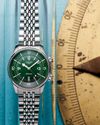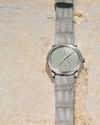
You might recall a famous scene from the 1923 silent film Safety Last where the great actor and stuntman Harold Lloyd dangled from the side of a New York skyscraper, at one moment hanging on for dear life on the hands of a clock. You almost certainly known this image, even if you do not know the film or Lloyd, and as a watch-loving person – as you certainly must be – you might have wondered how in the world was the actor able to grab hold of the clock’s hands? Were they not shielded by glass or something? Depending on your age and how strong a grip watches have on you, you might have even wondered that before thinking about how this scene was shot.
Indeed, in ages long past, one might adjust a watch by turning the hands themselves, as you might also have noticed from films and other depictions and recreations of the past. Movements, all mechanical back in these periods, were a little better protected but not by much. The clockwork was protected by doors, through which servicing was done, and the largest ones were walk-in (or climb-in) engines. Pocket watches were much the same, with the movements of key-wind and key-set watches needing to be accessed directly to, well, wind and set them. The invention of the keyless works by Adrien Philippe (of Patek Philippe) in 1843 went a long way towards resolving this issue, and other advances in winding and setting the time generally made watches safer and easier to use. That is to say, the machine itself was less at risk of unintentional damage from handling and from the influence of the outside world.
Esta historia es de la edición Issue 72 de WOW Singapore.
Comience su prueba gratuita de Magzter GOLD de 7 días para acceder a miles de historias premium seleccionadas y a más de 9,000 revistas y periódicos.
Ya eres suscriptor ? Conectar
Esta historia es de la edición Issue 72 de WOW Singapore.
Comience su prueba gratuita de Magzter GOLD de 7 días para acceder a miles de historias premium seleccionadas y a más de 9,000 revistas y periódicos.
Ya eres suscriptor? Conectar

BUOYANT HEAVYWEIGHTS
The ubiquitous use of titanium and carbon fibre does not satisfy a growing number of watch lovers; the indisputable rise of quiet design vexes them. The recent release of hefty and heavy timepieces, especially in the dive watch segment, proves that some just like it big

YEN FOR PRECISION
While we typically think of watchmaking as a Swiss matter, this ignores the powerful contributions of Japanese industry and know-how. We begin this deep dive with a look at the biggest names in the game

LEGENDARY DEPTHS
From pioneering chronographs to revolutionizing dive watches, Longines has always been at the forefront of horological advancements. Explore how the Swiss brand's journey through water-resistance shaped the future of dive watches-and made a splash in the process

LEAPING AHEAD
IWC updates the perpetual calendars in its Portugieser range with four new models

HOLDING THE HIGH GROUND
Chanel's 2024 collection represents a rare moment where haute couture and haute horlogerie coexist perfectly

SARTORIAL TIMING
Parmigiani Fleurier encourages us to take a second, and perhaps third, look at the new Toric collection of watches

LEFT HAND DRIVE
The DOXA SUB 300T Aristera is a tribute to the brand's heritage in dive watches, combining the original design with a left-handed twist for 2024, offering the standout features that made DOXA renowned while breaking new ground in functionality

LIVING HISTORY
A. Lange & Söhne has spent the better part of this year celebrating the 25th anniversary of the seminal Datograph. With the Datograph Handwerkskunst, the watch is elevated to the highest level

THE PURSUIT OF PERFECTION
Since its inception, Rolex has never wavered in its pledge to create the world's finest watches for anyone, anywhere

SWEET SPOT
The Longines Legend Diver is just the right amount of watch for a contemporary sports model that could also pull dress watch duties